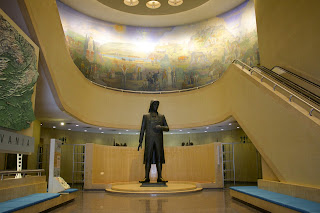Thanks for today’s post go to guest blogger Beth Hager, Director of Strategic Initiatives for the PHMC. I’ll add a shameless plug and say that the Trailheads feature in the spring issue of Pennsylvania Heritage looks at Midcentury Modern architecture at other sites along the PA Trails of History. (And be sure to check out the March program listings if you’re looking for something to do this weekend!)
 |
| State Museum and Archives Complex (and some really cool cars), courtesy PA State Archives |
Fifty years ago
The State Museum and Archives Complex opened in Harrisburg. A hallmark of Midcentury Modern architecture, it was a dramatic contrast to traditional designs and settings that typically housed historic collections. Interest in the building’s design has ebbed and flowed, but as is often the case, perspective is gained over several decades, and classic, iconic styles come back into vogue. Have you noticed that commercials and ads now often feature an updated '50s or '60s ranch house as the perfect home setting instead of the earlier Craftsman style we saw so much of in the last decade or so? Are you a fan of the TV series
Mad Men? If you know the show, it would not be a surprise if you saw lead character Don Draper checking out the William Penn statue in Memorial Hall, The State Museum’s colossal Midcentury masterpiece!
 |
| Statue by Janet de Coux (photo by Beth Hager) |
The return of '60s motifs to popular culture happily coincides with the 2014 listing of The State Museum and Archives Complex to the National Register of Historic Places and the complex’s 50 year milestone. PHMC is hosting a number of special events throughout the year to mark this anniversary. One program to note is an invitation to submit photographs to a juried photo exhibit featuring Midcentury Modern architecture (1930-80) in Pennsylvania, now through June 30, 2015. Photos will then be selected by a stellar panel of jurors – Dennis Hockman, Editor of
Preservation Magazine, National Trust for Historic Preservation; photojournalist and Midcentury Modern specialist Betsy Manning of Philadelphia; and David Oresick, Executive Director, Pittsburgh’s Silver Eye Center for Photography. The resulting show will be on display at The State Museum October 25, 2015, through February 28, 2016.
 |
| Light fixture, Memorial Hall (photo by Don Giles) |
What will we be looking for? Creative shots of hidden and not-so hidden exterior and interior shots of Midcentury architecture from throughout the Commonwealth by photographers of any level of expertise, enthusiast to professional. There will be a “best of show” purchase prize offered, as well as a “best of The State Museum and Archives Complex” purchase prize. Between now and June 30, photographers who pay
general admission and sign up at The State Museum’s front desk may bring tripods into the museum during their visit. And for some special access, I will be leading a tour of the museum for photographers on Sunday, April 26, from 1-3 pm (contact me at
bhager@pa.gov to sign up for the tour in advance – spaces are limited). We’ll be going up to the rarely seen 5th-floor administrative offices where we’ve just restored the lobby to its Midcentury Modern best and refurbished the furniture originally purchased in 1964. Don Draper would be proud.
For more guidance on spotting Midcentury Modern architecture in Pennsylvania, visit exhibit juror Betsy Manning’s photography exhibit, “
UnCommon Modern,” which showcases great examples and features of this period, on view through April 26 at The State Museum.
Find the
official rules for the juried photo exhibit at The State Museum’s web site. Watch for special programs throughout the year, including an exciting black tie gala hosted by the
Pennsylvania Heritage Foundation on October 24, 2015, almost 50 years to the day of the complex’s original dedication.
Join us for fun and new insights into our Midcentury Modern roots at The State Museum and Archives Complex in 2015!











